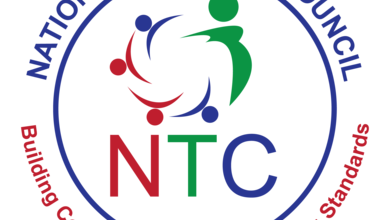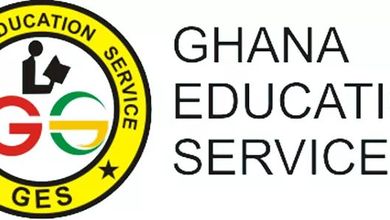Download the Ghana National Teaching Standards NTS
Download the Ghana National Teaching Standards NTS
Download the Ghana National Teaching Standards NTS
NATIONAL TEACHERS’ STANDARDS FOR GHANA: GUIDELINES
HOW ARE THE TEACHERS’ STANDARDS ORGANISED?
The Standards are divided into three main domains, each with its sub-divisions:
You can download the NTS here
JOIN TEACHER PROFESSIONAL DEVELOPMENT WITH OVER 11,000 TEACHERS
Professional Values and Attitudes
Professional Development
Community of Practice
Professional Knowledge
Knowledge of Educational Frameworks and Curriculum
Knowledge of Learners
Professional Practice
Managing the Learning Environment
Teaching and Learning
Assessment
These three domains and aspects encompass what teachers should value, know
and do, and intersect with one another to develop a teacher competent enough to
teach at the end of their four-year initial teacher training.
NTC Trains NTS Compliance Officers to Inspect Teachers’ Work in the Country
THE TEACHERS’ STANDARDS
1 Professional Values and Attitudes
Professional Development
The Teacher(s):
a) Critically and collectively reflects to improve teaching and learning.
b) Improves personal and professional development through lifelong learning and
Continuous Professional Development.
c) Demonstrates effective growing leadership qualities in the classroom and wider
school.
Community of Practice
The Teacher:
d) Is guided by legal and ethical teacher codes of conduct in his or her development
as a professional teacher.
e) Engages positively with colleagues, learners, parents, School Management
Committees, Parent-Teacher Associations, and the wider public as part of a community
of practice.
f) Develops a positive teacher identity and acts as a good role model for students
g) Sees his or her role as a potential agent of change in the school, community and
country.
2 Professional Knowledge
Knowledge of educational frameworks and curriculum
The Teacher:
a) Demonstrates familiarity with the education system and key policies guiding it.
b) Has comprehensive knowledge of the official school curriculum, including
learning outcomes.
c) Has secure content knowledge, pedagogical knowledge, and pedagogical content
knowledge for the school and grade they teach in.
d) At pre-primary and primary the teacher knows the curriculum for the years
appropriate to multigrade classes; has good knowledge of how to teach beginning
reading and numeracy and speaking, listening, reading and writing, and to use at
At least one Ghanaian language as a medium of instruction.
Knowledge of students
The Teacher:
e) Understand how children develop and learn in diverse contexts and apply this
in his or her teaching.
f) Takes account of and respects learners’ cultural, linguistic, socio-economic and
educational backgrounds in planning and teaching.
3 Professional Practice
Managing the learning environment
The Teacher:
a) Plans and delivers varied and challenging lessons, showing a clear grasp of the
intended outcomes of their teaching.
b) Carries out small-scale action research to improve practice.
c) Creates a safe, encouraging learning environment.
d) Manages behavior and learning with small and large classes.
Teaching and Learning
The Teacher:
e) Employs a variety of instructional strategies that encourage student participation
and critical thinking.
f) Pays attention to all learners, especially girls, and students with Special Educational
Needs, ensuring their progress.
g) Employs instructional strategies appropriate for mixed ability, multilingual, and
multi-age classes.
h) Sets meaningful tasks that encourage learner collaboration and lead to
purposeful learning.
i) Explain concepts using examples familiar to students.
j) Produces and uses a variety of teaching and learning resources including ICT, to
enhance learning.
Assessment
The Teacher:
k) Integrates a variety of assessment modes into teaching to support learning.
l) Listens to learners and gives constructive feedback.
m) Identifies and remediates learners’ difficulties or misconceptions, referring
learners whose needs lie outside the competency of the teacher.
n) Keeps meaningful records of every learner and communicates progress clearly to
parents and learners.
o) Demonstrates awareness of national and school learning outcomes of learners.
p) Uses objective criterion referencing to assess learners.
| File Name | National Teaching Standard |
| File Type | |
| File Size | 1.41MB |
| Source; | Ntc.gov.gh |
| Download Link | Click Here to Download |
seekersnewsgh.com






